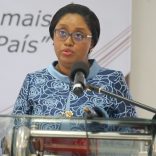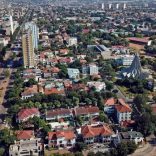Mozambique: Over 204 million dollars channelled to sovereign wealth fund
Donors want to help, but Mozambique must deserve it – Standard Bank

Lusa (File photo) / "What the country needs is an agreement and, [after] an agreement with creditors and donors is reached, the recovery of the economy must be led by the private sector," said Standard bank's chief economist in Mozambique.
Fáusio Mussa, Standard Bank’s chief economist in Mozambique, told Lusa on Friday that international donors “want to help the country” and that what is important is to restore investor confidence and maintain fiscal consolidation.
“International donors want to help Mozambique and the first step is for Mozambique to reach an agreement with the International Monetary Fund so that support can resume,” Mussa said in an interview with Lusa.
“Foreign aid depends on a number of factors,” Mussa said, the first of which was the disclosure of the audit commissioned by international consultancy Kroll on the US$ 1.4 billion of ‘hidden debt’ and the renegotiation and restructuring of this debt with creditors.
“The IMF continues to work with the government to reach an agreement and in May we had a strong signal that increases the expectation of reaching that agreement later this year,” the economist said, referring to the delivery of the audit report to the attorney-general.
“It is expected that audit report will be published, which will also allow investors to move forward the process of renegotiation and debt restructuring,” Mussa said. “Donors want to move forward and when they have the report this will ease the process.”
Asked whether the renegotiation of the hidden debt repayments must occur before or after Kroll’s audit report disclosure and how much would be involved in either case, Mussa replied that this should happen only after the release of the report, while stressing that “more than the amount, the important thing is to restore investor confidence”.
“What the country needs is an agreement and, [after] an agreement with creditors and donors is reached, the recovery of the economy must be led by the private sector.”
Even after restructuring the debts, which will mean lower payments to creditors in the short term but worsening of medium and long-term loan conditions, “the government must continue to cut spending and maintain fiscal consolidation”, Mussa stressed.
On the economic outlook for the country, Standard Bank is optimistic, anticipating economic growth of 4.1 percent in 2017, a revision upward from the previously forecast 3.8 percent.
“The absence of military tension, a better outlook for agriculture and the expectation of a substantial increase in coal production, coupled with the closeness of a final investment decision in the ENI liquefied natural gas project, have led us to increase the prospects of GDP growth in 2017 from 3.8 to 4.1 percent,” Mussa said.












Leave a Reply
Be the First to Comment!
You must be logged in to post a comment.
You must be logged in to post a comment.